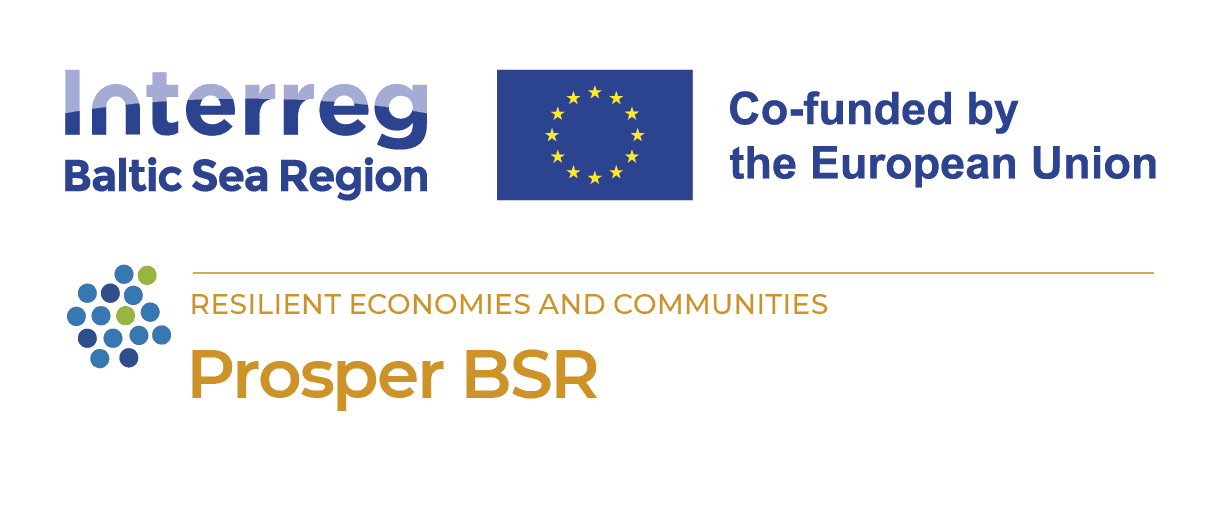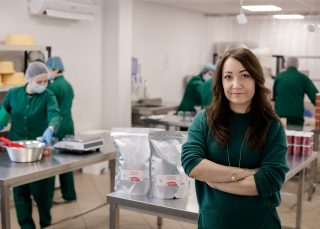
Success Story: Social Responsibility as Part of Reciprocal Trade-Off
22 June 2023
According to Lithuanian Statistics, over 75,000 Ukrainians have arrived in Lithuania since the beginning of the war in Ukraine. After receiving temporary shelter, the main issue for the Ukrainians has been how to make a living. Responsible businesses in Lithuania have stepped up to help the refugees, including Supergarden, a producer of freeze-dried berries, spices and vegetables.
Laura Kaziukonienė, the founder and CEO of the company, says that the decision to help the Ukrainians was a natural one. The company had a branch in Ukraine, so when the war broke out, she invited people who worked in Ukraine to Lithuania. However, only one manager and her daughter came. At the beginning of December last year, they went back to Ukraine to join with their husband and father.
Afterwards, Supergarden employed a few more Ukrainians in the factory, with whom it had no previous working or personal relationship. They settled in Panevėžys and began to look for work. “Although their specialty was not in packaging, we took the time to train them,” Kaziukonienė says. “Some of them took temporary jobs, and one woman plans to put down her roots in Lithuania and continue working for Supergarden. Her child attends a school in Panevėžys, and she supports her family.” As for foreigners, a student from Greece has been currently doing an internship at the company, having come through the Erasmus international student
Overcoming the Language Barrier
Most Ukrainians who come to Lithuania can only communicate in their mother tongue or Russian. According to the Lithuanian Statistics Department, more than 90% of Lithuanians speak at least one foreign language; however, not all of them speak the same language. Only the older generation can communicate in Russian without problems, while those born after 1986 have a good command of English, French, German and other languages. Supergarden’s CEO notes that even then, it is possible to communicate.
For example, a manager, who came from Ukraine, worked at the company as an export manager for Russian-speaking markets. Supergarden’s sales department consists of younger people, the majority of whom do not speak Russian. Nevertheless, one Ukrainian woman had already learnt a number of Lithuanian words over the course of a year, the words directly related to her job, product names, etc. Kaziukonienė observes that those who do not know Russian communicate with the help of the google translate, while the sales manager, who has not yet mastered Russian, has been improving his skills, as the Ukrainian employee does not speak English at all.
The situation is less complicated in Supergarden’s manufacturing sector, where older staff members speak Russian.
Adaptability Is Critical
Supergarden specializes in freeze-dried berries, spices and vegetables. Freeze-drying is by far the most efficient food preservation technology. This process preserves up to 98% of the nutrients, vitamins and minerals in vegetables, berries, fruit and other foods. The company’s CEO points out that broad horizons and adaptability are critical for their innovative business.
This is especially true in recent times, when everything has been constantly changing, i.e. pandemics and war. Kaziukonienė thinks that employing foreigners in this current geopolitical situation is very useful because it broadens one’s thinking. “For one, it teaches you that Russian can be seen not as an aggressor but as another foreign language that you don’t carry around on your shoulders,” the CEO notes. “Also, working with Ukrainians nurtures one’s empathy. It is one thing to see war refugees on the TV and quite another to see that refugee in person every day, to see how they cry when they receive messages from their relatives who have remained in Ukraine.” Kaziukonienė is convinced that such situations teach us to be more sensitive to surroundings and at the same time to realize how important it is to adapt quickly to new circumstances.
Not Just Charity
Supergarden fosters a long-standing friendship with the Panevėžys Day Care Centre Šviesa, where children and young people with Down syndrome and other intellectual disabilities receive assistance. They help company by folding small paper packages. It is a very demanding activity that develops fine motor skills. Together with the Aurika printing company, Supergarden organized a competition across Lithuania where children drew packaging for the company’s products. All proceeds from the sale of products with these labels will go to Šviesa. “Of course, just like every year at Christmas, we will also give gifts to the Center’s patrons,” the CEO says.
Supergarden’s CEO points out that social responsibility is not a charity given occasionally and driven by the desire to appear good. From Kaziukonienė’s point of view, social responsibility is a reciprocal trade-off. “We help the children by providing them with the activities and by giving financial support, and the children help us by doing the packaging. It is the same with the Ukrainians: We have given them all the moral and material support we can and they repay us with sincere and quality work,” the CEO says. The company is not just giving but also getting back. In this way, social responsibility becomes a very well-oiled mechanism that builds long-term relationships.






